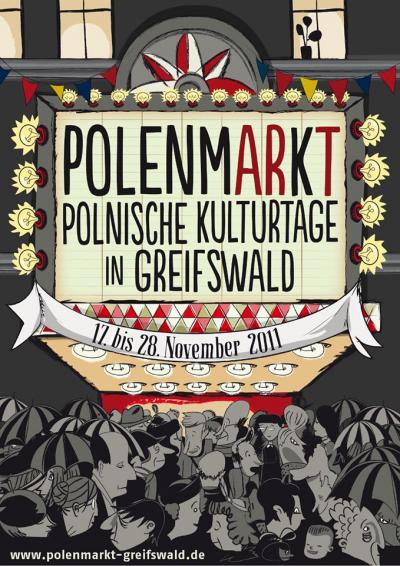The “polenmARkT” Festival in Greifswald

Despite all these difficulties, however, the festival continues to run and is now an established name in the Western Pomeranian cultural events calendar. The “polenmARkT“ is definitely not a small event. The encounters with Polish literature, exhibitions, concerts, film screenings and theatre performances take place at the most important cultural centres in Greifswald, such as the Koeppenhaus literature centre, the Pomeranian State Museum, the St. Spiritus centre, the Theatre of West Pomerania, the Hans Fallada house and the Alfried Krupp College, a state-of-the-art centre for science. Smaller events are held in cafés, an antiques shop and in the libraries. The festival now extends well beyond the Greifswald boundaries and has created offshoots in Anklam, Stralsund, in the imperial Baltic Sea resorts and in the cities of Ueckermünde and Löcknitz near the border. The “polenmARkT” is visited by around four thousand visitors every year, making it one of the most important cultural events in the northeast of Germany.
And although the festival emerged from academia, it has not been a student-led event for a long time now. The program is aimed at a broad public and takes into account the diverse interests of all those involved. In the past few years, numerous famous authors have appeared, who are well known both in Poland and abroad, such as Olga Tokarczuk, Andrzej Stasiuk, Stefan Chwin, Joanna Bator, Wojciech Kuczok, Szczepan Twardoch and many more. There is also a broad musical offering. Concerts by the outstanding jazz musician Leszek Możdżer, the composer and instrumentalist Mikołaj Trzaska and the bands Voo Voo, Dezerter, Brygada Kryzys and the Klezmer band Kroke serve the discerning taste of music lovers. For several years now, the festival has also offered a programme for children, including book samples for the very little ones. There is also “serious” culture,e with talks on history and linguistics, Polish language courses and even cookery courses that serve to keep the shared European heritage in Poland and Germany alive at the hob. Fundamentally, the festival is there to showcase both timeless and current topics. That is why there were films and discussions about the situation in the Ukraine, about the fate of Germans in Poland after the war, about the Katyn massacre, about Polish forced labourers and about the role of women in times of “Solidarność”. The intense discussions resulting from these talks often go on long into the night.


















